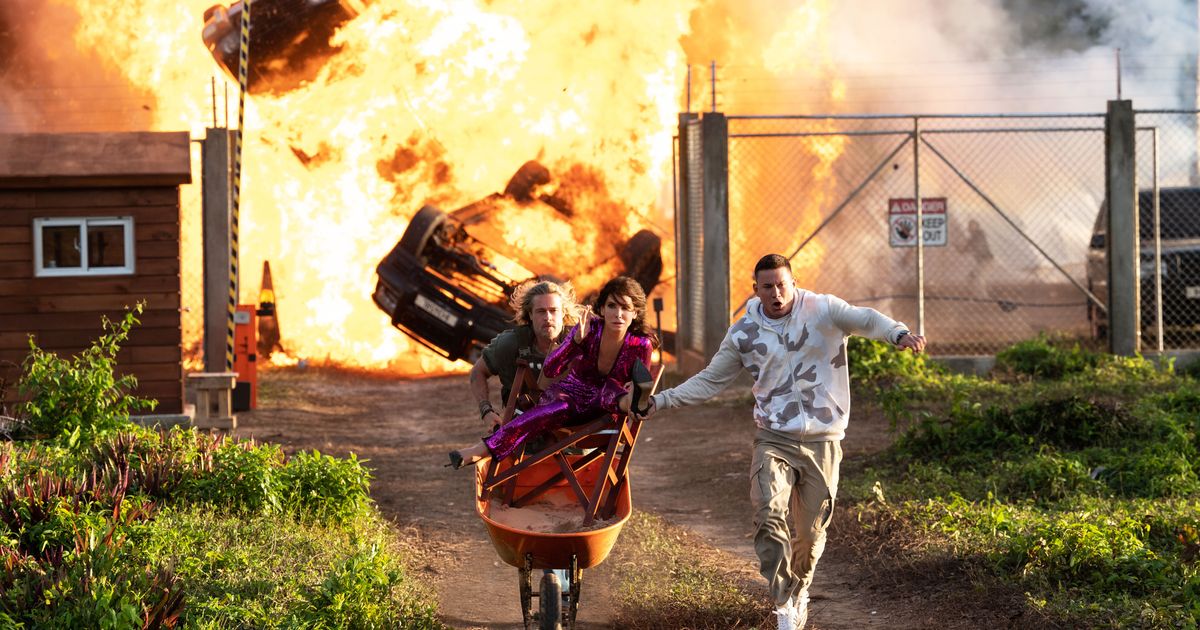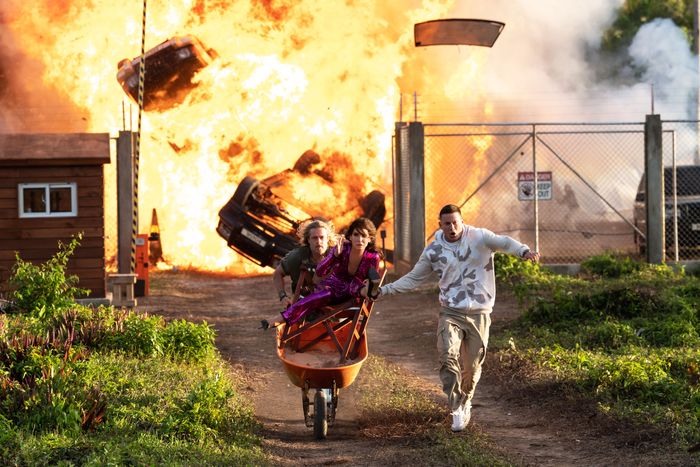
It Can’t Quite Capture Old Movie Magic

How can we expect audiences to respond to adult movies like this if they lack the charm of the genres they’re plundering for inspiration?
Photo: Kimberley French/Paramount Pictures
I have a confession to make: I have never warmed up to Sandra Bullock as a star. It isn’t that I haven’t enjoyed her presence onscreen. It’s just that on her own, she doesn’t feel like a supernova; she dims or brightens by virtue of whom she is acting against. When it’s Keanu Reeves? That’s when she truly shines, in movies like 1994’s Speed, where her determination and wit perfectly flirt with Reeves’s doting machismo. (I even have a soft spot for their dynamic in the admittedly weird 2006 romantic drama, The Lake House.) She has the appropriate charm in Miss Congeniality, a 2000 film that again highlights her prickly steadfastness while giving her physical comedy alongside seasoned scene partners like Michael Caine and Candice Bergen. In 2013’s Gravity, her drive is so well-harnessed that the chemistry she cultivates with George Clooney persists long after he disappears. But as an unyielding matriarch in The Blind Side, a 2009 film built on baldly uncomfortable racial politics that garnered her a Best Actress Oscar, she fails to feel whole or engaging. As the supposed center of the film, she lacks any force beyond curdling white saviorism.
The Lost City, released this weekend, is the kind of film meant to rest on the laurels of star power. Not just Bullock’s, but her immediate cast members’, too. The film — which scans as Romancing the Stone cosplay updated for the current moment — is the kind of romantic action-adventure caper we haven’t seen in decades. It doesn’t waste time. At a fleet 92 minutes, the film dives into a story about Loretta Sage (Bullock), a highly successful romance novelist whose life has been defined by loneliness since the death of her beloved husband. Her apparent knowledge of a lost city — reflected in her swooning recent book — gets her kidnapped by a madcap, disgruntled billionaire (Daniel Radcliffe) who believes she can locate the priceless treasure he’s been spending oodles of cash to find. Loretta proves to be more capable than her captors realize, and she’s not alone — the sweet himbo who models on her covers, Alan (Channing Tatum), sets out to save her, leading to high jinks and, theoretically at least, romantic sparks set against the backdrop of a dangerous jungle on a forgotten island. “The movie comes with an additional set of stakes specific to Hollywood’s post-pandemic future,” the New York Times’ Kyle Buchanan posits. “As the theatrical business constricts, will people still go see an old-fashioned comic adventure where the actors lack any superpowers besides A-list charisma?” Here’s the problem. The Lost City may have the A-listers, but it doesn’t possess the craft necessary to spotlight their skills. Audiences shouldn’t be blamed if they are cold to the film. How can we expect people to respond to adult movies like this if they lack the charm of the genres they’re plundering for inspiration?
The Lost City isn’t terrible, just aggressively mediocre. It is the kind of movie you put on in the background after coming across it on TBS while you fold laundry on a Sunday afternoon. If anything, The Lost City makes evident not a lack of stars, but a persistent inability on the part of contemporary Hollywood to know what to do with them. The idea to do a thinly masked Romancing the Stone revamp with an older actress (Bullock is a few years shy of 60) whose defining characteristic is her intelligence — who innately radiates warmth and romance and adventure — is a good one. But the makers of The Lost City think pointing a camera at her is enough. They forget Romancing the Stone had Robert Zemeckis shepherding into existence a script by Diane Thomas, a waitress turned screenwriter who died tragically and young. The Lost City has Adam and Aaron Nee helming a story by a bunch of men and Dana Fox. It’s romance by committee, and no one has any idea how to capture the heat necessary to make the pair work.
The Lost City aims to be quick-witted, giddy, a light delight. It’s mostly inoffensive, save for one arguably major problem: the weird colonialism lurking in the story and the patronizingly thin portrayal of the Indigenous people who inhabit the make-believe island on which the main action takes place. It’s an aspect not new to The Lost City, evident in these romance-adventure flicks focused on white folks finding love against a backdrop of so-called exoticism. Once you notice this grating aspect, you can’t help but squirm. The discomfort isn’t helped by the directors and cinematographer, who can’t capture the awe of natural surroundings or light the actors in ways that truly highlight the beauty of their bodies. Instead they are framed, lit, and blocked in ways that obscure their gorgeousness rather than put it on a pedestal. (A dramatic cave sequence near the end is so drab it’s embarrassing.)
But perhaps the most glaring issue is the lack of proper chemistry between Bullock and Tatum, who can’t manufacture the friction required of a destined romance. I can see why, on the page, Tatum and Bullock have allure. He’s inviting but not overbearing in his charm, and great at playing carefree men with an inner sweetness and a knack for dancing. She has a fierce sense of self and undaunted intellect. But there’s no “It” factor. You know what I mean: that undeniably potent fire between actors that makes us want to bask in their glow and also root for them to take their clothes off and fall into bed. For a film about a romance novelist that is trying to exist within a very specific canon of adventure films, there’s a stunning lack of sexiness. So when the two finally kiss at the very end of the film, it feels perfunctory — as if the film just remembered, “Oh yeah, sure, they should have some physical connection.” Bullock has a more intriguing connection with Jack Trainer (Brad Pitt), a former Navy SEAL and full-time badass who is introduced chomping on the innards of a coconut. Alan ropes him into helping save Loretta in a cameo that doesn’t last long but leaves the most intense impression. Pitt knows what this film needs and how to skewer his own image. (Has anyone in Hollywood leaned into the sensuality of his own consumption as much as this man?) His long blond hair cascades behind him as the bombs he’s planted go off, bringing a twinge of memories of his early-1990s heartthrob status in Legends of the Fall. His physicality (and that of his stuntmen) is spry, graceful. When Loretta flirts with him and asks why the hell is he so handsome, with a glint in his eye, he responds, “My father was a weatherman.” It’s the kind of specificity and élan the rest of the film lacks.
It’s clear the moment Pitt is onscreen what his fate will be, but it’s a brief ride I enjoyed being on. The remaining film is listless and tired. Sure, Radcliffe is aiming for gonzo intensity. As Loretta’s agent, Da’Vine Joy Randolph is trying her damndest to bring energy to the film, but all I was left feeling was disappointment that Hollywood can’t stop falling into the “Black best friend” trap. Everything in the story feels micromanaged, all the edges smoothed off. Even when Loretta and Alan witness a hidden tomb encased in verdant foliage, with the molten lava of a volcano framing the discovery, I felt neither curiosity nor wonder. I fixated instead on the smoothness and lack of texture of the scenario. In the end, The Lost City never trips the wire in the brain of pure pleasure — visual, emotional, or otherwise.
